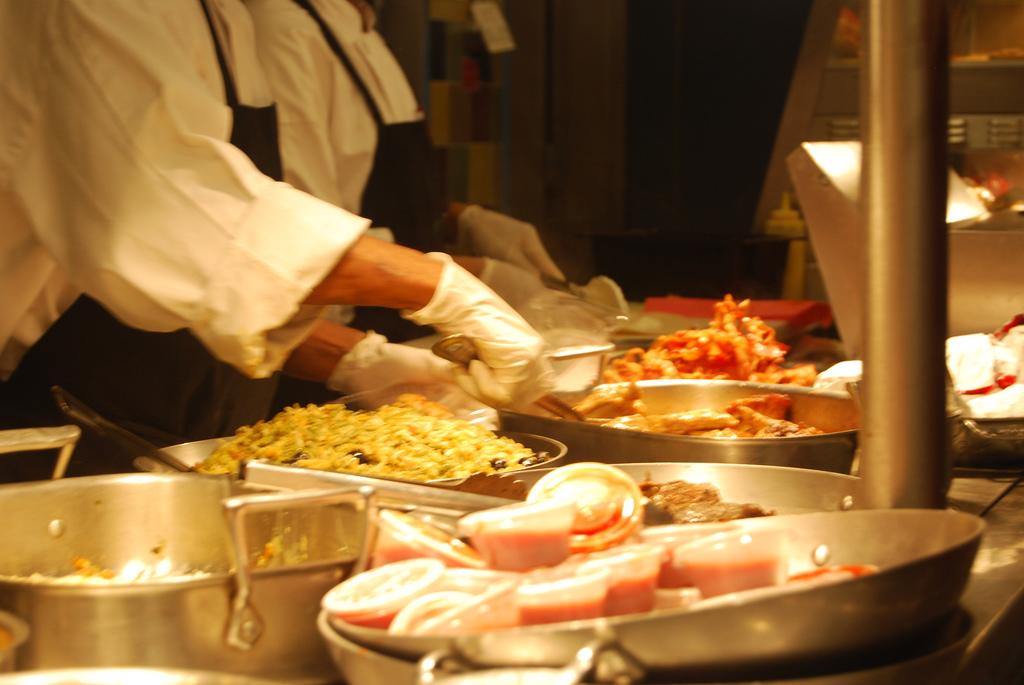Fordham Combats Increasing College Obesity
May 27, 2011

Published: October 11, 2007
FCLC—Binges and benders are terms usually associated with the more deplorable aspects of college life. Alcohol and drugs notwithstanding, these terms also apply to what experts deem an increasingly great concern for college students: overeating.
Three out of every ten students are classified as obese, according to the American College Health Association. In the face of this, Fordham has taken measures—both inside the cafeteria and out—to combat the obesity epidemic head on.
“I think [the cafeteria] offers an excellent assortment of foods, including fruits and vegetables,” said Robert Torado, assistant director of Student Health Services at Fordham. He also stated that the portion sizes in the cafeteria look healthy. “It seems like it’s easier for students to choose their portion size,” he continued.
The average teen now weighs approximately fifteen pounds more than he or she did in the 1960s, according to a study by the North American Association for the Study of Obesity, USA Today reported.
Nutritionists blame increasingly large portions of snacks and their availability to college students via the campus cafeteria. The average student gains about 10 pounds between the start of freshman year and the end of sophomore year, reports the Journal of American College Health.
Portions, both in the college cafeteria and off-campus, have drastically expanded. For example, the average hamburger weighed 1.6 ounces in the 1950s. In 2003, the average hamburger weighed up to eight ounces, according to www.mealmatters.org.
So how does Fordham decide what ends up on our plates? Brian Poteat, general manager of Fordham’s Hospitality Services stated that “the executive chef on each campus chooses from the Sodexho base menu.” The chef then works with a “registered dietician” to ensure that nutritionally-sound meals are being offered, he said.
Torado claimed that students at Fordham actually appear healthier than those in the other city colleges where he has worked. “Students here seem to eat healthily, and I have not seen the level of obesity at Fordham that I have seen elsewhere.”
Torado contributes the lower levels of obesity at Fordham, at least partially, to the health center’s resources. “We have a nutritionist available for the students—she helps them devise plans to eat more healthily. If a student comes in for another health problem, for example a sore throat, and they are also obese, besides the presenting problem we will discuss their weight with them, explore their family history, give them information, and possibly refer them to the nutritionist,” Torado said.
“A few of my friends from other colleges have definitely gained weight,” Callie Fisher, FCLC ’10, stated. “At Lincoln Center I feel like we’re not as prone to gain weight because we walk a lot and our system of payment in the cafeteria makes it harder to overload on food as opposed to the way it is at other campuses.” Fisher does, however, acknowledge the possibility for weight gain: “New York has the best pizza ever! And the food in the cafeteria doesn’t seem particularly healthy.”
Fisher may have a point about the New York pizza, but, at least according to Sodexho, the cafeteria has been making a considerable effort to cook more healthily. Poteat stated that Sodexho was the first company in the campus dining industry to begin using “zero trans fat oils” in all food preparation.
“At home a lot of people tend to sit down and eat dinner with their families—that’s more portion-controlled, and home-cooked meals are more nutritionally-balanced,” Janine Repka, FCLC ’10, voiced. “At school it’s tempting to just eat chicken fingers and fries. Also, those unhealthier options are less expensive than a salad—so, because of that, college students are likely to opt for something that’s not as healthy because it’s cheaper.”
Being overweight can affect more than just a student’s physical health. Mental health often suffers, as well. “Weight and [resulting] self-esteem issues can affect a student’s ability to perform to his or her highest capacity in college,” said Maya Vaknin, supervising psychologist of Fordham Counseling and Psychological Health Services.
Vaknin, however, said that the counseling center advises more students who are underweight and suffering from anorexia or bulimia than they do students who are overweight. “It is important to remember that from a mental health perspective, it is not actually a person’s weight that impacts their life, but their feelings about their weight. In other words, a person could be ‘overweight’ and feel great about themselves and be psychologically quite healthy, while a person of average weight could feel bad about his or her body image,” she stated.
Fordham intends to provide students with enough resources to be proactive about staying healthy. Poteat said that Food Services will offer “healthy cooking classes” next semester, so students “can learn proper cooking preparation and techniques for healthy meals.” In addition to this, students can access nutrition facts for all cafeteria meals by logging onto www.sodexhousa.com or www.balancebodymindsoul.com.
“Stroke, heart attack, and diabetes are all some of the leading causes of death,” Torado said. All of these ailments are caused or worsened by obesity.
“Students should always think about their future,” he continued. “What they do to their bodies now will be reflected in their health years later.”











